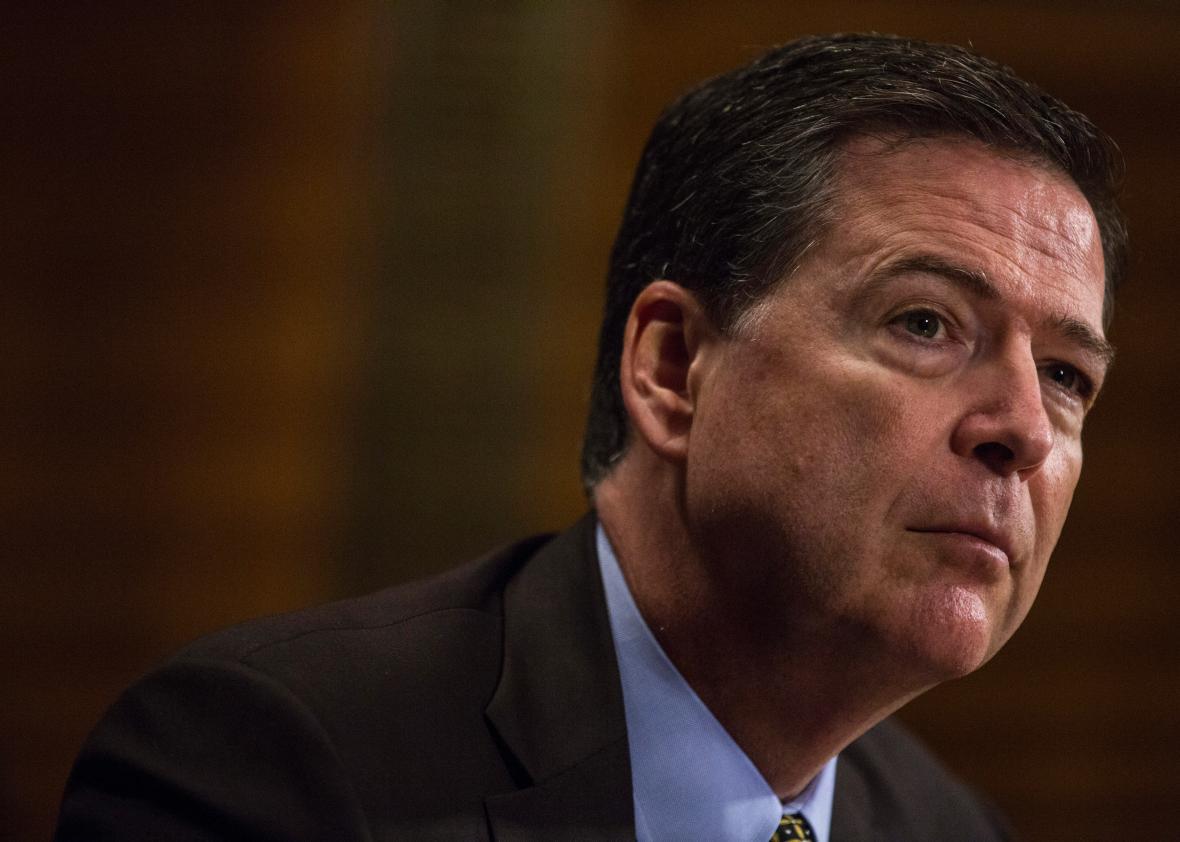“I need loyalty, I expect loyalty,” President Trump said to then–FBI Director James Comey on Jan. 27 during a one-on-one dinner, according to a statement that Comey will deliver Thursday before the Senate Intelligence Committee. Comey’s prepared testimony—which you can read below in its entirety—then describes his reaction to that statement: “I didn’t move, speak, or change my facial expression in any way during the awkward silence that followed. We simply looked at each other in silence.”
About two weeks after their dinner—and one day after Michael Flynn was forced to resign as national security adviser amid revelations that he had improperly discussed sanctions with the Russian ambassador—Trump concluded a counterterrorism briefing in the Oval Office by asking everyone but Comey to leave the room. Once they were alone, Trump told Comey, “I want to talk about Mike Flynn.” Trump proceeded to talk about how good of a guy Flynn was and how much he had been through, before saying to Comey, “I hope you can see your way clear to letting this go, to letting Flynn go. He is a good guy. I hope you can let this go.”
Comey’s statement—which backs up reporting published last month in the New York Times—goes into novelistic detail about five private conversations he had with Trump, all of which Comey took notes on immediately afterward (a step Comey says he did not feel compelled to take during the Obama administration).
According to his statement, Comey felt during the Jan. 27 dinner that Trump was trying to establish “some sort of patronage relationship” with him, particularly because Trump began the dinner by asking Comey if he wanted to stay on as the head of the FBI. “I found [that] strange because he had already told me twice in earlier conversations that he hoped I would stay, and I had assured him that I intended to,” Comey writes. “He said that lots of people wanted my job and, given the abuse I had taken during the previous year, he would understand if I wanted to walk away.”
Throughout his prepared testimony, Comey recounts that Trump repeatedly asked him to help lift “the cloud” over his presidency by publicly stating that Trump was not personally under FBI investigation. While Comey’s statement is not explicit about what exactly “the cloud” referred to when Trump used the phrase, it appears that Trump was alluding at least in part to the infamous opposition-research dossier that began circulating in the intelligence community during the 2016 campaign. That dossier, prepared by former MI6 agent Christopher Steele, contained unverified claims about Trump engaging in embarrassing acts with Russian prostitutes and was the subject of Comey’s very first conversation with Trump on Jan. 6. At the Jan. 27 dinner, Comey’s statement says:
[T]he President returned to the salacious material I had briefed him about on January 6, and, as he had done previously, expressed his disgust for the allegations and strongly denied them. He said he was considering ordering me to investigate the alleged incident to prove it didn’t happen. I replied that he should give that careful thought because it might create a narrative that we were investigating him personally, which we weren’t, and because it was very difficult to prove a negative. He said he would think about it and asked me to think about it.
On the morning of March 30, Trump called Comey at the FBI and said, according to Comey’s paraphrasing, that “he had nothing to do with Russia, had not been involved with hookers in Russia, and had always assumed he was being recorded when in Russia.”
Comey’s final conversation with Trump before he was fired on May 9 took place by phone on April 11. That morning, Comey recalls, Trump asked him what he had done about his request to “get out” that he was not personally under investigation. Comey told Trump he had passed the request on to Dana Boente, who was then serving as acting deputy attorney general but that he hadn’t heard back. Trump said he would have his “people” reach out to Boente, and Comey replied that having the White House Counsel do so would be the best course of action.
According to Comey’s statement, Trump then said something bewildering: “Because I have been very loyal to you, very loyal; we had that thing you know.”
“I did not reply or ask him what he meant by ‘that thing,’” Comey writes.
Comey will have an opportunity Thursday to elaborate on the facts laid out in his statement. Slate will be live-blogging the proceedings. President Trump is reportedly planning to do the same.
Here’s the full statement:
